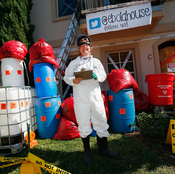Copyright ©2014 NPR. For personal, noncommercial use only. See Terms of Use. For other uses, prior permission required.
ROBERT SIEGEL, HOST:
In an ideal world, healthcare workers returning from West Africa would get a quick blood test. It could prove that they are not coming home with the Ebola virus. A test like that would put to rest much of the anxiety surrounding these doctors, nurses and scientists. Well, unfortunately, even the best blood test in the world cannot do that. NPR's Richard Harris explains why.
RICHARD HARRIS, BYLINE: There's an exquisitely sensitive blood test for Ebola. It uses a technology called PCR or polymerase chain reaction. It can detect extraordinarily small traces of genetic material from the Ebola virus. The catch is the test is usually used on blood samples and Thomas Geisbert at the University of Texas medical branch in Galveston says the virus doesn't tend to start out in the blood of an infected person.
THOMAS GEISBERT: The initial sites of replication actually are not in the blood itself. They're mostly in tissues like spleen or liver.
HARRIS: It's not practical to sample those organs to look for Ebola, but Geisbert says the virus doesn't stay there forever.
GEISBERT: Over time as more and more cells get infected, the virus is then released into the blood.
HARRIS: At that point, the PCR test can detect the virus and when it's still in extraordinarily low concentrations - maybe one or two virus particles per drop. And Geisbert says that concentration is so low, an infected person's body fluids pose a miniscule risk to others.
GEISBERT: However, as the disease progresses and people start to get sick, in that same small drop of blood all of the sudden maybe now there's a hundred particles or a thousand particles.
HARRIS: At this point, body fluids do pose a risk and it's also when people start to feel sick.
GEISBERT: You're going to start to detect the virus about the same time that you're going to have clinical signs of disease show up.
HARRIS: So sensitive as the PCR test is, it doesn't give you any advanced warning that a person is infected. But this also explains why people aren't a risk to others until they actually fall ill. Richard Harris, NPR News.
Copyright © 2014 NPR. All rights reserved. No quotes from the materials contained herein may be used in any media without attribution to NPR. This transcript is provided for personal, noncommercial use only, pursuant to our Terms of Use. Any other use requires NPR's prior permission. Visit our permissions page for further information.
NPR transcripts are created on a rush deadline by a contractor for NPR, and accuracy and availability may vary. This text may not be in its final form and may be updated or revised in the future. Please be aware that the authoritative record of NPR's programming is the audio.
Comments
You must be signed in to leave a comment. Sign In / Register
Please keep your community civil. All comments must follow the NPR.org Community rules and terms of use, and will be moderated prior to posting. NPR reserves the right to use the comments we receive, in whole or in part, and to use the commenter's name and location, in any medium. See also the Terms of Use, Privacy Policy and Community FAQ.





